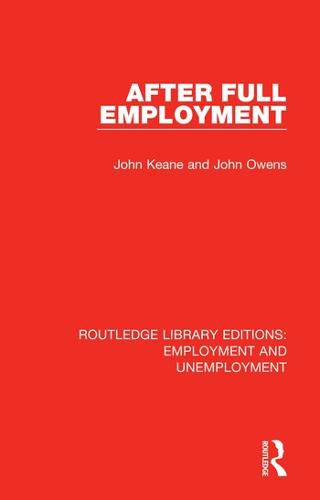Readings Newsletter
Become a Readings Member to make your shopping experience even easier.
Sign in or sign up for free!
You’re not far away from qualifying for FREE standard shipping within Australia
You’ve qualified for FREE standard shipping within Australia
The cart is loading…






First published in 1986. This book analyses, at an introductory level, the four main and competing political interpretations of the cause of unemployment and the future of paid work - social democracy, free market liberalism, the disciplinary state, and utopian socialism. Considered together these four interpretations are highly revealing - and challenging. They raise considerable doubts about the viability or desirability of policies design to ‘get the jobless back to work’.
Keane and Owens’ central argument is that the post-war policy of full male employment, as well as its politic, economic and social preconditions, are not repeatable, Starting with Keynes and Beveridge, they explain how and why full employment welfare states developed in Britain and the US, and how they had in turn been replaced by the ‘strong state, free market’ programmes of Thatcher and Reagan.
By focusing on an issue which was, and still is, at the heart of political debate, the book provides a lucid and approachable guide to four key strands of political thought it Britain and the US. It will be an ideal introductory text for students of politics, sociology and economics.
$9.00 standard shipping within Australia
FREE standard shipping within Australia for orders over $100.00
Express & International shipping calculated at checkout
Stock availability can be subject to change without notice. We recommend calling the shop or contacting our online team to check availability of low stock items. Please see our Shopping Online page for more details.
First published in 1986. This book analyses, at an introductory level, the four main and competing political interpretations of the cause of unemployment and the future of paid work - social democracy, free market liberalism, the disciplinary state, and utopian socialism. Considered together these four interpretations are highly revealing - and challenging. They raise considerable doubts about the viability or desirability of policies design to ‘get the jobless back to work’.
Keane and Owens’ central argument is that the post-war policy of full male employment, as well as its politic, economic and social preconditions, are not repeatable, Starting with Keynes and Beveridge, they explain how and why full employment welfare states developed in Britain and the US, and how they had in turn been replaced by the ‘strong state, free market’ programmes of Thatcher and Reagan.
By focusing on an issue which was, and still is, at the heart of political debate, the book provides a lucid and approachable guide to four key strands of political thought it Britain and the US. It will be an ideal introductory text for students of politics, sociology and economics.